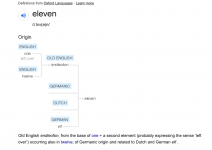VOYAGER
Junior Member
- Joined
- Jun 24, 2022
- Member Type
- Interested in Language
- Native Language
- Turkish
- Home Country
- Turkey
- Current Location
- Turkey
The logic followed in English for the generation of cardinal numbers between 20 and 100 is not valid for the cardinal numbers 11 to 19. For example 21=twenty-one, 22=twenty-two, 23=twenty-three and so forth as usual. This is to say that basic numbers from 1 to 9 are written after 20, 30, 40 up to 90 to generate any two decimal number between 20 and 100 accordingly. But as all you know, the words for the cardinal numbers between 11 and 19 are written as eleven, twelve, thirteen, fourteen, fifteen, sixteen, seventeen, eighteen and nineteen.
However they would be named as ten-one for 11, ten-two for 12, ten-three for 13, ten-four for 14, ten-six for 16, ten-seven for 17, ten-eight for 18 and ten-nine for 19 if the same logic used for the cardinals between 20 to 100 had been followed. I know what I write is bizarre but I just wonder whether or not it makes sense for the native English speakers. Please do believe in that the cardinal numbers 11 o 19 in my native language are spoken by this reasoning.
I hope there may be some people who can seriously think on this probably strange post.
However they would be named as ten-one for 11, ten-two for 12, ten-three for 13, ten-four for 14, ten-six for 16, ten-seven for 17, ten-eight for 18 and ten-nine for 19 if the same logic used for the cardinals between 20 to 100 had been followed. I know what I write is bizarre but I just wonder whether or not it makes sense for the native English speakers. Please do believe in that the cardinal numbers 11 o 19 in my native language are spoken by this reasoning.
I hope there may be some people who can seriously think on this probably strange post.
